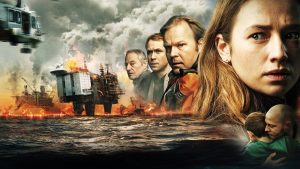NORWEGIAN writers Harold Rosenlow-Eeg and Lars Gudmestad are already responsible for the on-screen destruction of parts of their country, via tsunami in The Wave (2015), earthquake in The Quake (2018) and Russian military invasion in three television seasons of Occupied.
Now they have turned their attention to a massive fault in the seabed putting the entire North Sea oil platform network at risk.
The Burning Sea is both an impressive thriller and a salutary warning about the risk of human and environmental disaster that goes hand-in-hand with large-scale economic development.
The film perhaps weighs its eco-disaster warning a little too heavily on its sleeve, but to the layman it probably presents a scenario that doesn’t seem out of the realms of possibility.
It was made on a pretty small budget for a disaster film and it does show throughout.
Even though the wide-shot visuals of the destruction are done well, the amount of human and equipment resources we see on-screen responding to the disaster is a fraction of what would be involved in a real situation where the destruction of oil rigs was causing human death and widespread environmental disaster on an international scale.
Like The Wave and The Quake, the film follows a familiar narrative structure not just for these two writers but for disaster films in general with the large-scale response running alongside a smaller, human story.
In this case Bjorn Floberg is the main, grizzled veteran face of the emergency response team while marine robotics engineer Sofia (Kristine Kujath Thorp) and her work colleague Arthur try to save her partner Stian from one of the platforms at imminent risk of going up in flames.
If you like your disaster movies, or even just an interesting thriller, laced with a more realistic warning of ecological risks then The Burning Sea is right up your alley.
